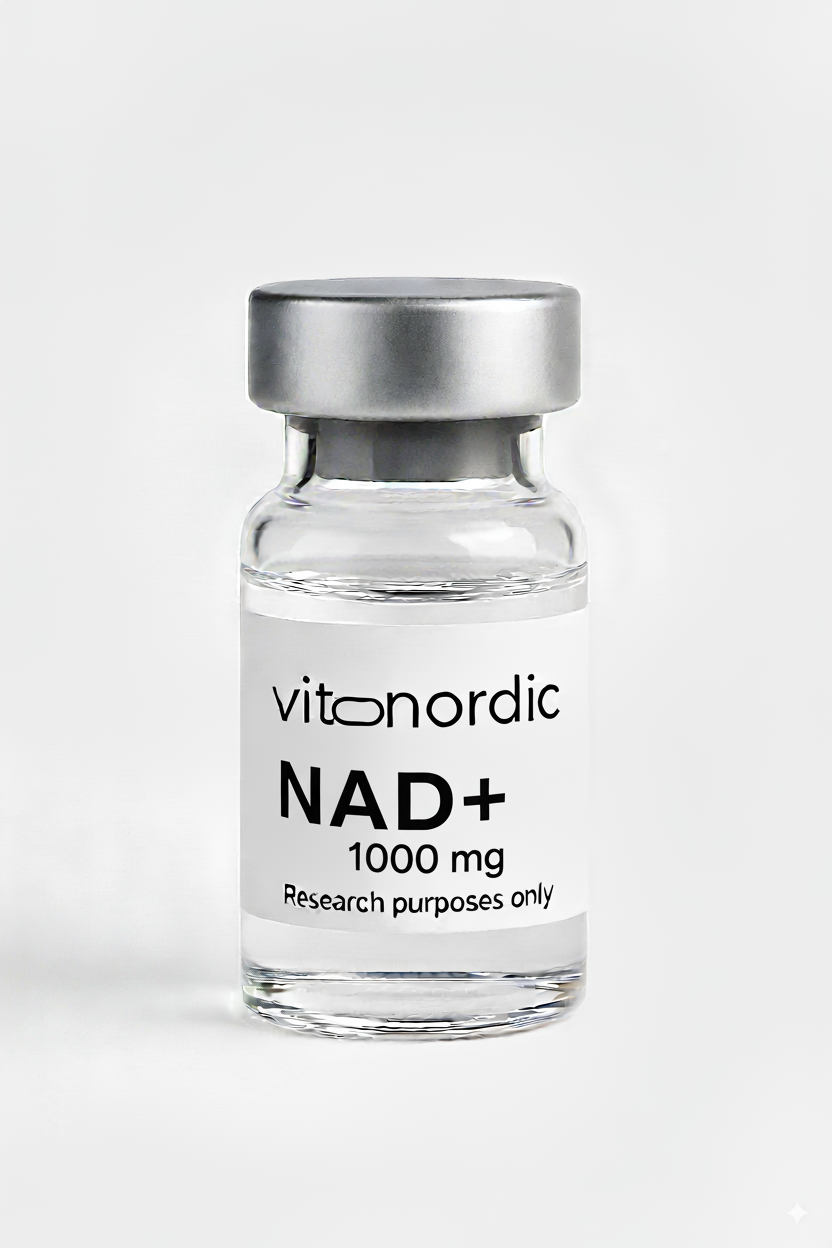 Image 1 of 1
Image 1 of 1


NAD+
NAD+ – Research Compound for Cellular Energy, DNA Repair & Anti-Aging
What is NAD+?
NAD+ (Nicotinamide Adenine Dinucleotide) is a vital coenzyme that naturally occurs in the body and plays a central role in energy metabolism, DNA repair, and cellular function. It is closely tied to mitochondrial activity, making it a major focus in research on aging, metabolic health, and bioenergetics.
Scientists and laboratories are investigating NAD+ for its influence on ATP production, mitochondrial function, sirtuin activity, and neuroprotection. It has become a widely studied compound in preclinical models exploring anti-aging, metabolic support, and cell renewal.
How NAD+ works
NAD+ functions as an electron carrier in redox reactions, driving the conversion of nutrients into cellular energy (ATP). It also supports enzymes such as sirtuins and PARPs, which are associated with gene repair, inflammation regulation, and longevity.
Research suggests NAD+ may:
Enhance mitochondrial energy production
Support DNA repair and cell regeneration
Reduce oxidative stress and improve cellular resilience
Influence pathways linked to aging and cognitive performance
Contribute to neuroprotection in models of neurodegeneration
Research applications
Mitochondrial health and bioenergetics
DNA repair and cell renewal models
Studies of aging, cognitive decline, and neuroprotection
Research into detoxification and metabolic disorders
Reference compound in mitochondrial research
Preparation & storage
Supplied in lyophilized powder form (1000 mg per vial), to be reconstituted with bacteriostatic water
Store at 2–8°C after reconstitution
Shelf life: up to 60 days after mixing
Purity & quality
Every batch of NAD+ is independently tested for sterility and purity (≥99%). A certificate of analysis (COA) is available with product documentation.
Important note
This product is supplied strictly for laboratory and scientific research. It is not intended for human consumption.
Package contents
1 vial with 1000 mg NAD+ (Buffered, lyophilized)
NAD+ – Research Compound for Cellular Energy, DNA Repair & Anti-Aging
What is NAD+?
NAD+ (Nicotinamide Adenine Dinucleotide) is a vital coenzyme that naturally occurs in the body and plays a central role in energy metabolism, DNA repair, and cellular function. It is closely tied to mitochondrial activity, making it a major focus in research on aging, metabolic health, and bioenergetics.
Scientists and laboratories are investigating NAD+ for its influence on ATP production, mitochondrial function, sirtuin activity, and neuroprotection. It has become a widely studied compound in preclinical models exploring anti-aging, metabolic support, and cell renewal.
How NAD+ works
NAD+ functions as an electron carrier in redox reactions, driving the conversion of nutrients into cellular energy (ATP). It also supports enzymes such as sirtuins and PARPs, which are associated with gene repair, inflammation regulation, and longevity.
Research suggests NAD+ may:
Enhance mitochondrial energy production
Support DNA repair and cell regeneration
Reduce oxidative stress and improve cellular resilience
Influence pathways linked to aging and cognitive performance
Contribute to neuroprotection in models of neurodegeneration
Research applications
Mitochondrial health and bioenergetics
DNA repair and cell renewal models
Studies of aging, cognitive decline, and neuroprotection
Research into detoxification and metabolic disorders
Reference compound in mitochondrial research
Preparation & storage
Supplied in lyophilized powder form (1000 mg per vial), to be reconstituted with bacteriostatic water
Store at 2–8°C after reconstitution
Shelf life: up to 60 days after mixing
Purity & quality
Every batch of NAD+ is independently tested for sterility and purity (≥99%). A certificate of analysis (COA) is available with product documentation.
Important note
This product is supplied strictly for laboratory and scientific research. It is not intended for human consumption.
Package contents
1 vial with 1000 mg NAD+ (Buffered, lyophilized)
